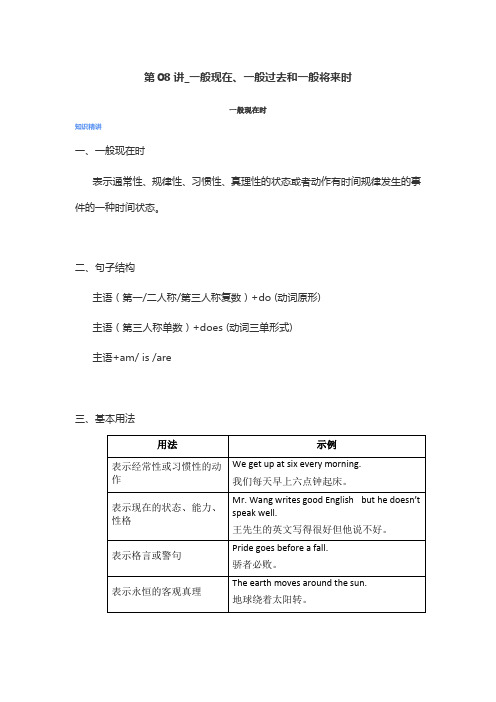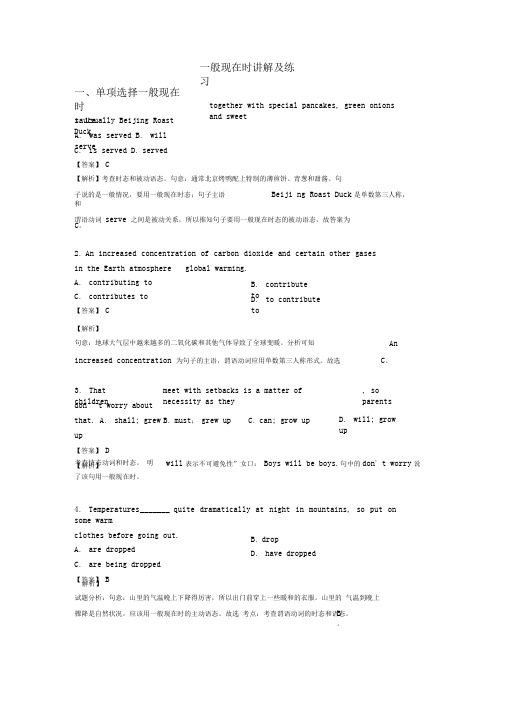一般现在时.doc讲解及练习
- 格式:doc
- 大小:43.50 KB
- 文档页数:5

一般现在时讲解与习题一般现在时是英语中应用最广泛的时态之一,是初中英语语法重点。
它表示1)经常性、习惯性的动作或存在的状态。
e.g. I go to school on foot. He is very busy now. 2)表示主语的特征、性格、能力、爱好等。
e.g. He can swim. I work hard. I like watching TV. 3)表示客观真理e.g. There are seven days in a week. The moon moves round the earth.其结构按正常语序,即“主语+谓语+其它”,有时为了起强调作用,时间状语也可提前.其句式变化可分为两种情况1)表示动作,一般人称作主语的,变否定句须在动词前加助动词don’t;变一般疑问句须在句首加助动词do。
E.g. They have lunch at 12:00. They don’t have lunch at 12:00. Do they have lunch at 12:00? 2)单三人称做主语的,变否定句须在动词前加助动词doesn’t;变一般疑问句须在句首加助动词does。
Jenny speaks English very well.Jenny doesn’t speak English very well.Does Jenny speak English very well?含有be动词的要在be上做变化.Danny is a good student.Danny isn’t a good student.Is Danny a good student?其时间状语为often、usually、always、sometimes等频率副词,on Saturdays、、every day 等。
A.一般现在时1.一般现在时的构成一般现在时主要用动词原形来表示。
主语是第三人称单数时,动词后面要加-s或-es。

A、一般现在时定义一般现在时。
表示通常性、规律性、习惯性的状态或者动作(有时间规律发生的事件)的一种时间状态。
基本结构构成1. be动词属于系动词, 表示事物和人的状态。
在一般现在时态的句子中主要表现为三种形式:am ,is、are。
后面往往接形容词或名词做表语。
如:(1)I’m strong. (strong形容词做表语)(2)He is a boy.( a boy名词做表语)含有be动词的句子在进行否定、疑问句变化时,都要在be动词上变化。
(1)变为否定句:主语+be+ not+其他。
即,直接在be后not.①I’m not a Chinese girl.②You are not right.③He is not strict with me.(2)变为一般疑问句:Be+主语+其他?即把be动词提到主语的前面。
注意:当肯定句主语为第一人称I和We时,变一般疑问句要变为第二人称,be动词也要相应的变为are.同样肯定句中的my和our 也要变为your.①I am a worker. (变为一般疑问句)→Are you a worker?②We are good friends. (变为一般疑问句)→Are you good friends?③She is from Japan. (变为一般疑问句)→Is she from Japan?(3)变特殊疑问句:一般的要求为“对划线部分提问”,即用特殊疑问词代替划线的部分,后接省略划线部分的一般疑问句(一般不再出现划线部分)。
如:①I’m well.(对划线部分提问)→How are you?②She is from America. (对划线部分提问)→Where is she from?2、情态动词:can,may,must,need为情态动词地一般现在时,need有时还做实义动词用。
我们这里主要以can为例来说明情态动词的用法。
情态动词后面必须接动词的原形。

一般现在时的用法一、概述一般现在时表示习惯性、经常性、反复性的动作或存有的状态。
“习惯性、经常性、反复性”是一般现在时的三大特性,它不表示特定时间内发生的事。
二、一般现在时的结构时态的结构指的是动词的变化形式。
一般现在时间有两种结构,一种是动词原形,用于主语为非第三人称时的情况;另一种为动词的第三人称单数形式,用于主语为第三人称时的情况。
Eg1.We often get up early in the morning.Eg2.My father often gets up early in the morning.三、谈谈“主语为三单,其后动词s添”在一般现在时中,当主语为第三人称单数时,谓语动词要用第三人称单数形式。
能够简单叙述为“主语为三单,其后动词s添”。
何谓第三人称单数?用一句话概括就是“非你、非我、非复数”,如he, she, it, my father, my mother, my sister, our English teacher, Tom, Mike, Liu Jia, China, my book, etc.Eg3.He sometimes goes to school by bike.Eg4.My father works in the hospital as a doctor.四、动词第三人称单数变化规则动词第三人称变化的规则与可数名词复数变化的规则相同。
规则一、一般在词尾加-s。
如:looks, puts. reads, sees, skis等。
规则二、以-o, -s, -x, -sh, -ch结尾的加-es。
如:goes, does, misses, passes, mixes, fixes, pushes, wishes, watches, teaches,等。
规则三、以辅音字母加y结尾的,变y为i,再加-es。
注意一定是辅音字母加y才变,若是元音字母加y,则直接加-s。

一般现在时知识精讲一、一般现在时表示通常性、规律性、习惯性、真理性的状态或者动作有时间规律发生的事件的一种时间状态。
二、句子结构主语(第一/二人称/第三人称复数)+do (动词原形)主语(第三人称单数)+does (动词三单形式)主语+am/ is /are三、基本用法四、时间状语1. 表示频率的副词: always, usually, often, sometimes, never, hardly, seldom…2. every/once+名词: every day/ week/ year, once a week/ month …3. 表示时间的短语: twice a day, on weekends, on Mondays…五、一般现在时动词三单的变化规律六、相关句式三点剖析一、考点:时态是英语学习中的核心内容之一,是英语学习的基础。
自然,时态考查是各种英语考试尤其是中考时的座上宾。
动作发生的时间决定时态,时态决定动词的形式,而考卷中的时态题通常没有给出明确的时间标志词,考试需领悟所提供的语境来做出判断。
只有推断出动作发出的正确时间,才可能正确答题,这就要求考生在熟练掌握时态结构、用法并牢记常用的时间状语的基础上,要充分利用上下文中隐含的信息来捕捉时间,找准答题的突破口。
二、重难点:一般现在时在考试中的重难点是:句子结构、基本用法、标志时间状语、动词三单的变化规则及相关句式的变化。
三、补充点:1. 表示按计划或安排好的,或将要发生的动作,可用一般现在时表将来。
但只限于start, begin, leave, go, come, arrive, return, take place等。
例:My train leaves at 7:00 this afternoon.我乘坐的火车将在今天下午7点离开。
2. 在复合句中,当主句是一般将来时,时间或条件状语从句的谓语动词只能用一般现在时来表示将来要发生的动作。

一、一般现在时填空题1.Bob ________ (have) a new schoolbag.【答案】has【解析】【详解】句意:鲍勃有一个新书包。
根据句意可知,句子是一般现在时,主语是第三人称单数形式,故行为动词应用单三式;have,有,其单三式为has。
故填has。
2.We both ________ (like) this city because the weather is always wet and cold.【答案】dislike【解析】【详解】句意:我们都不喜欢这个城市,因为天气总是又湿又冷。
根据“because the weather is always wet and cold.”可知,空处指不喜欢这个城市,用like的反义词dislike,主语是we,时态是一般现在时,所以谓语动词用原形。
故填dislike。
3.My best friend ________ (have got) beautiful long hair.【答案】has got【解析】【详解】句意:我最好的朋友有漂亮的长头发。
分析句子成分可知,空格处作谓语。
根据“My best f riend”可知,主语为单数,没有特殊时间标志,说明一般情况,该句要用一般现在时,谓语动词用单三形式。
have got意为“拥有”,其单三形式为has got。
故填has got。
4.The girl ________ (have) two eggs and a bottle of milk every day.【答案】has【解析】【详解】句意:这个女孩每天吃两个鸡蛋和一瓶牛奶。
本句时态是一般现在时,主语是第三人称单数,动词用三单,故填has。
5.Lucy __________ (have) a basketball game each year.【答案】has【解析】【详解】句意:露西每年有一场篮球比赛。
have有,是动词,根据句中的 each year可知句子时态用一般现在时,主语Lucy是第三人称单数形式,所以谓语动词也要用第三人称单数形式,故填has。

一般现在时讲解及练习一、单项选择一般现在时1.Usually Beijing Roast Duck together with special pancakes, green onions and sweet sauce. A . was served B . will serve C . is served D .served 【答案】 C 【解析】考查时态和被动语态。
句意:通常北京烤鸭配上特制的薄煎饼、青葱和甜酱。
句 子说的是一般情况,要用一般现在时态;句子主语 Beiji ng Roast Duck 是单数第三人称,和 谓语动词 serve 之间是被动关系,所以推知句子要用一般现在时态的被动语态,故答案为 C 。
2.An increased concentration of carbon dioxide and certain other gases in the Earth atmosphere global warming. A . contributing to C . contributes to 【答案】 C B . contribute to D . to contribute to 【解析】 句意:地球大气层中越来越多的二氧化碳和其他气体导致了全球变暖。
分析可知 An increased concentration 为句子的主语,谓语动词应用单数第三人称形式。
故选 C 。
3. That children meet with setbacks is a matter of necessity as they , so parentsdon ' t worry about that. A . shall; grew up 【答案】 D 【解析】 B .must ; grew up C .can; grow upD . will; growup考查情态动词和时态。
明了该句用一般现在时。
一般将来时一、一般将来时的定义一般将来时表示在现在看来即将要发生的动作或存在的状态。
常用时间副词tomorrow,soon或短语next year / week / month,in a few days, in the future, sometime 做状语.如:What will you do this afternoon. 你今天下午干什么?We will have a meeting tomorrow。
我们明天要开会。
He is going to study abroad next year。
明年他要出国学习。
二、一般将来时的基本用法及构成一般将来时的基本用法是表示单纯的将来事实,由“will / shall + 动词原形”构成:We shall have a lot of rain next month。
下个月将下很多雨。
I think she will pass the exam. 我想他考试会及格的。
三、表示将来时间的几种常见方法英语中除了“will /shall+动词原形”表示半来时态外,还可以有以下多种方法:(1)用“be going to+动词原形”表示。
主要表示打算和预测:We are not going to stay there long. 我们不准备在那里多待.(表打算)I'm afraid they're going to lose the game. 恐怕他们会赛输。
(表预测)Look, it’s going to rain。
瞧,要下雨了.(表预见)注:be going to 后接动词go和come时,通常直接改用其进行时态:Where is he going to go?/ Where is he going? 他打算到哪里去?(2)用“be to+动词原形”表示。
主要表示按计划或安排即将要发生的动作;有时也表示命令、禁止或可能性:He is to leave for Beijing tomorrow. 他决定明天去北京.Tell him he's not to be back late。
一般现在时Present Tense一、概念:表示通常性、规律性、习惯性的状态或者动作(有时间规律发生的事件)的一种时间状态。
拆开来讲就是:时间:指动作发生在“现在”的时间段内。
那么,多长的时间才叫“现在”呢一天状态:一般现在时最容易迷惑的一个问题,就是拿不准什么叫“经常发生的动作或存在的状态”这个问题要分三层来讲:1.“经常发生的动作”,比如每天起床、吃饭、上学,一个星期去几次超市或新华书店等。
这些事件中,有的是有规律的,有的是偶尔做几次。
这些都算经常发生的事件。
我们要告诉人们的,是这个动作经常发生,是一般的情况而不是具体的某一次。
2.事物存在的状态。
3.有些动作或状态是永恒的,比如长江向东流、地球绕着太阳转,比如谚语中举的事例、文学作品中描绘的事例,像“好马不吃回头草”等等二、基本用法:1.表示经常性或习惯性发生的动作。
如:I always get up at 7 o’clock in the morning.我总是在早上7点起床。
We often read books at school.我们在学校经常看书。
They usually have dinner at 6:00 in the evening.他们通常在晚上6点吃晚餐。
2.表示现在的状态或特征。
如:She loves English very much.她非常爱英语。
We are always at home on weekends.周末我们总留在家。
Tom is an exellent player.汤姆是一位优秀的运动员。
3.表示客观的现实。
如:The sun rises in the east.太阳从东方升起。
Summer comes after spring.夏天在春天的后面4.用在按计划、规定或安排发生的事情。
如:The plane leaves at 9:30.飞机9点30分起飞。
Tomorrow is Sunday.明天是星期天。
一、一般现在时填空题1.You won’t pass the exam if you ________ (not be) careful enough.【答案】aren’t【解析】【详解】句意:如果你不够细心,你就不会通过考试。
本句是if引导的条件状语从句,从句用一般现在时,主语是you,故填aren’t。
2.We both ________ (like) this city because the weather is always wet and cold.【答案】dislike【解析】【详解】句意:我们都不喜欢这个城市,因为天气总是又湿又冷。
根据“because the weather is always wet and cold.”可知,空处指不喜欢这个城市,用like的反义词dislike,主语是we,时态是一般现在时,所以谓语动词用原形。
故填dislike。
3.Mike often ________ (play) the violin in the evening.【答案】plays【解析】【详解】句意:Mike经常在晚上拉小提琴。
根据“often”可知,此句为一般现在时;主语Mike为第三人称,因此谓语动词用单数。
故填plays。
4.Liu Xiang _____________ (run) very fast and I want to be a man like him.【答案】runs【解析】【详解】句意:刘翔跑得非常快,我想成为像他一样的人。
根据空缺处所在的句子是客观事实,所以时态是一般现在时,主语“Liu Xiang”是第三人称单数,所以用动词run“跑”的第三人称单数runs,故填runs。
5.— Sometimes I ________ (eat) lunch at school. What about you?— Me too.【答案】eat【解析】【详解】句意:——有时我在学校吃午餐。
一、一般现在时填空题1.My brother with the twins often ________ (fly) a kite at weekends.【答案】flies【解析】【详解】句意:我哥哥和双胞胎经常在周末放风筝。
根据“often”可知,此句要用一般现在时,主语my brother是单数形式,动词用三单形式,故填flies。
2.The experiment he devoted himself to ________ a perfect success. (prove)【答案】proved##proves【解析】【详解】句意:他致力于的实验证明是圆满成功的。
此处在句中作谓语,“证明”这一动作发生在过去或现在均可,主语是The experiment,动词使用动词过去式或动词三单。
故填proved/proves。
3.My best friend ________ (have got) beautiful long hair.【答案】has got【解析】【详解】句意:我最好的朋友有漂亮的长头发。
分析句子成分可知,空格处作谓语。
根据“My best friend”可知,主语为单数,没有特殊时间标志,说明一般情况,该句要用一般现在时,谓语动词用单三形式。
have got意为“拥有”,其单三形式为has got。
故填has got。
4.Jack’s father is a ________ (飞行员).【答案】pilot【解析】【详解】句意:杰克的父亲是一名飞行员。
根据空格前的冠词a可知,其后要跟可数名词并且是单数。
“飞行员”所对应的英文是pilot。
故填pilot。
5.—________ (be) you Jack? —No, I’m not. I’m Eric.【答案】Are【解析】【详解】句意:——你是Jack吗?——不,我不是。
我是Eric。
由语境可知,句子时态为一般现在时,且主语是第二人称you,be动词应用are,注意首字母大写。
1 一般现在时讲解和练习题 一般现在时 一、定义:一般现在时表示经常或习惯性的动作,也可表示现在的状态或主语具备的性格和能力。 例:(1).表示事物或人物的特征、状态。The sky is blue.天空是蓝色的。 (2).表示经常性或习惯性的动作。I get up at six every day.我每天六点起床。 (3).表示客观现实。The earth goes around the sun.地球绕着太阳转。
二、用法: 1.肯定句: 一般现在时中,没有be动词和情态动词,主语为第三人称单数(she ,he ,it )、单数可数名词、不可数名词的,动词要按规则加上s或es。主语是复数可数名词的肯定句,动词用原形。 例:She(He,It )likes fish. 她(他,它)喜欢鱼。(主语为第三人称单数) The table has four legs.桌子有四条腿。(主语为单数可数名词) Water boils at 100 degrees Celsius.水在100度沸腾。(主语为不可数名词) They go to school every day .他们每天都去上学。(主语是复数可数名词的,动词用原形)2.疑问句: (1)一般现在时中,句中有be动词(am , is , are )或情态动词(may , can , must , should)时,一般疑问句将be动词或情态动词放在句首。
由肯定句变为一般疑问句的步骤: a. 把be 动词(am , is , are )或情态动词(may , can , must , should)提前。 b.大写和小写的转换,句首的第一个字母要大写。 c.句末要加问号。 例:肯定句:She is a student . 疑问句:Is she a student ? 肯定句: He can swim. 疑问句:Can he swim? . 疑问句的回答:用什么问就用什么来回答。 Is she a student ? Yes, she is . Can you swim? Yes, I can . (2) 句中如果没有be动词(am , is , are )或情态动词(may , can , must , should)时,主语为第三人称单数(she ,he ,it )、单数可数名词、不可数名词的疑问句要用does 来提问。即在句首加does,句子中原有动词用原形 例:—Does he like Chinese? 他喜欢汉语吗? —Yes, he does. 是的,他喜欢(汉语)。 —Does a dog eat meat? 狗吃肉吗? —No, it doesn’t. 不,它不吃(肉)。 (3) 句中如果没有be动词(am , is , are )或情态动词(may , can , must , should)时,主语为复数可数名词的疑问句要用do 来提问。 Do you like monkeys? No, we don’t. Do students study Englsih ? Yes , they do . 3. 否定句: (1)句中有be动词(am , is , are )或情态动词(may , can , must , should)时,否定句在be 2
动词和情态动词后加not, I am not a teacher. He can not fly . (2) 句中没有be动词(am , is , are )或情态动词(may , can , must , should)时,主语为第三人称单数的否定句,在动词原形前加does + not (doesn’t)。 He doesn’t like cats. (3)句中没有be动词(am , is , are )或情态动词(may , can , must , should)时,主语为复数可数名词的否定句,在动词原形前加do + not (don’t)。 They don’t go to school on Sundays.
在一般现在时中,当主语是第三人称单数时,谓语动词要用第三人称单数形式,即常在动词原形后加-s或-es。但有些同学们对于哪些主语是第三人称单数还不十分清楚,现归纳总结如下: 一、人称代词he, she, it是第三人称单数。如: He likes watching TV. 他喜欢看电视。 She has lunch at twelve. 她十二点吃午餐。 It looks like a cat. 它看起来像只猫。 二、单个人名、地名或称呼作主语;是第三人称单数。如: ①Han Mei looks like her mother. 韩梅看起来像她的母亲。 ②Beijing is in China. 北京在中国。 ③Uncle Wang often makes cakes. 王叔叔经常做蛋糕。 三、单数可数名词或"this / that / the+单数可数名词"作主语时,是第三人称单数。如: ①A horse is a useful animal. 马是有用的动物。 ②This book is yours. 这本书是你的。 ③That car is red. 那辆小汽车是红色的。 ④The cat is Lucy's. 这只猫是露茜的。 四、不定代词someone, somebody, nobody, everything, something等及指示代词this, that作主语时,是第三人称单数。如: ①Everyone is here. 大家到齐了。 ②There is something wrong with the watch. 这块手表有毛病。 ③This is a pen. 这是一支钢笔。 ④That is an eraser. 那是一块橡皮擦。 五、不可数名词作主语时为第三人称单数。如: ①The milk is in the glass. 牛奶在玻璃杯里。 ②The bread is very small. 那面包很小。 六、当数字或字母作主语时,看作第三人称单数。如: ①"6" is a lucky number. "6"是个吉利数字。 ②"I" is a letter. "I"是个字母。 动词+s的变化规则 1.一般情况下,直接加-s,如:cook-cooks, milk-milks 2.以s. x. sh. ch. o结尾,加-es,如:guess-guesses, wash-washes, watch-watches, go-goes 3
3.以“辅音字母+y”结尾,变y为i, 再加-es,如:study-studies 巩固练习题: 一、按照要求改写句子 1.This is my pencil ? (变一般疑问句) your pencil ? 2. These red socks are Kate’s . (变一般疑问句) socks Kate’s ? 3. I want to buy a big green bag . (变特殊疑问句 you want to buy ? 4. Mary does not have any books . (变肯定句)Mary books . 5. The clothing shop is on sale . (变为否定句) 6. She likes the black bag very much . (变为否定句) 7. I buy the pants for only 50 Yuan. (用she改写句子) the pants for only 50 Yuan. 8. It’s an English dictionary . (对画线部分提问) 9. Lily and Lucy are fifteen years old now . (对画线部分提问) Lily and Lucy ? 10. Her dog is 2 years and 5 months old . (变为否定句) Her dog 2 years and 5 months old . 11. I usually get up at seven o’clock . (用he改写句子) at seven o’clock . 12. He often has hamburger and apples for dinner . (变为一般疑问句) 13. My family always like thrillers . (对画线部分提问) your family always like ? 14. Jane’s sister wants to see the comedy . (变为一般疑问句) Jane’s sister to see the comedy ? 15. Maria and Jack come to this school on Monday .(对画线部分提问) Maria and Jack come to this school ? 三、完成句子 1. 他每天六点钟起床。 He ______ _____ _______ six every morning. 2. 小明经常去远足。 Xiao Ming _________ ________ hiking. 4
3. 她总是在星期天看望爷爷奶奶。 She _______ __________ her grandparents on Sundays. 4. Sandy周末上学吗? ________ Sandy _______ _______school on weekends? 5. 他什么时候去上班? When ________ he go to ________? 6. 李云喜欢秋天,不喜欢冬天。 Li Yun _________ autumn, but he _________ like winter. 7. 今天的天气怎么样? What’s the _________ like _________? 8. 她有电脑吗? ___________ she __________ a computer? 四、BE动词填空。 1. you Li Fen ? No, not . 2. Mr. green very busy?Yes , he . 3. He must at home . 4. Comedy very interesting . 5. What class you in ? 6. You and I good friends . 7. His friends very funny . 8. The twins very happy because they want to go to a movie . 五.用所给动词的适当形式填空。 1. My classmate (know) the man on the bike . 2. His sister usually (go) to school at 7:00 am . 3. Lin Tao (like) his new sweater . 4. Let me (have) a look . 5. Let’s (play) tennis ! 6. he (like) English ? 7. I want (go) to a movie . 8. He (not know)the teacher’s name . 9. Nice (meet) you ! 10. Can I (ask) the policeman ? 11. (sit) down and (have) a cup of tea . 12. (not look) at your book !